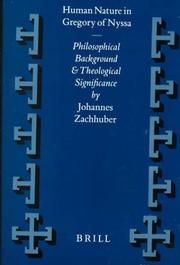| Listing 1 - 2 of 2 |
Sort by
|

ISSN: 0920623X ISBN: 9004115307 9004274324 9789004115309 9789004274327 Year: 2000 Volume: 46 Publisher: Leiden: Brill,
Abstract | Keywords | Export | Availability | Bookmark
 Loading...
Loading...Choose an application
- Reference Manager
- EndNote
- RefWorks (Direct export to RefWorks)
This volume explores Gregory Of Nyssa's concept of human nature. It argues that the frequent use Gregory makes of phusis -terminology is not only a terminological predilection, but rather the key to the philosophical and theological foundations of his thought. Starting from an overview of the theological landscape in the early 360's the study first demonstrates the meaning and relevance of universal human nature as an analogy for the Trinity in Cappadocian theology. The second part explores Gregory's use of this same notion in his teaching on the divine economy. It is argued that Gregory takes this philosophical theory into the service of his own theology. Ultimately the book provides an example for the mutual interaction of philosophy and Christian theology in the fourth century.
Theological anthropology --- Christianity --- History of doctrines --- 276 =75 GREGORIUS NYSSENUS --- Man (Christian theology) --- -Man (Christian theology) --- Griekse patrologie--GREGORIUS NYSSENUS --- -Gregory of Nyssa, Saint --- -Contributions in Christian doctrine of man --- Gregory, --- -Griekse patrologie--GREGORIUS NYSSENUS --- Ghirīghūriyūs, --- Grégoire, --- Gregor, --- Gregori, --- Gregorio, --- Grēgorios, --- Gregorius, --- Grigoli, --- Grigoriĭ, --- Grzegorz, --- Qiddīs Ghirīghūriyūs Usquf Nīṣṣ, --- Grigorije, --- Gregorius Nyssenus --- Gregor von Nyssa --- Gregorio di Nissa --- Gregorius van Nyssa --- Gregory of Nyssa --- Grégoire de Nysse --- Contributions in Christian doctrine of man. --- Humanities --- The Early Church --- Theological anthropology - Christianity - History of doctrines - Early church, ca 30-600.
Book
ISBN: 3631731108 Year: 2017 Publisher: Frankfurt am Main, [Germany] : Peter Lang Edition,
Abstract | Keywords | Export | Availability | Bookmark
 Loading...
Loading...Choose an application
- Reference Manager
- EndNote
- RefWorks (Direct export to RefWorks)
"Epistemological theories of the patristic authors seldom attract attention of the researchers. This unfortunate status quo contrasts with a crucial place of the theory of knowledge in the thought of such prominent authors as Origen and the Cappadocian fathers. This book surveys the patristic epistemological discourse in its various settings. In the context of the Church history it revolves around the Eunomian controversy, Eunomius' language theory and Gregory Nazianzen's cognitive theory, where the ideas of Apostle Paul were creatively combined with the Peripatetic teaching. In the framework of Biblical exegesis, it touches upon the issues of the textual criticism of the Homeric and Jewish scholarship, which had significantly shaped Origen's paradigm of the Biblical studies."--
Theology. --- Christian theology --- Theology --- Theology, Christian --- Christianity --- Religion --- Origen. --- Basil, --- Eunomius, --- Gregory, --- 30-600 --- Adamantius, --- Oregenes Adamantius, --- Origene --- Origenes Adamantius, --- Origenes, --- Origenis --- Orygenes --- Ūrījānūs --- Ghirīghūriyūs, --- Grégoire, --- Gregor, --- Gregori, --- Gregorio, --- Grēgorios, --- Gregorius, --- Grigoli, --- Grigoriĭ, --- Grigorije, --- Grzegorz, --- Qiddīs Ghirīghūriyūs Usquf Nīṣṣ, --- Bogoslov, Grigoriĭ, --- Bogoslov, Grigorije --- Grego., --- Gregorio Nazianzeno, --- Gregorios, --- Gregorius Nazianzenus, --- Gregory Nazianzen, --- Grigol, --- Grigorie, --- Grigoriĭ Bogoslov, --- Ighrīghūriyūs, --- Nazian., Grego., --- Nazianz, Gregor von, --- Nazianzen, Grigoriĭ, --- Nazianzenus, Gregorius, --- Nazianzus, Gregory of, --- Sfântul Grigorie, --- Eunomio, --- Eunomios, --- Barsegh, --- Basile, --- Basileios, --- Basili, --- Basilio, --- Basilius Caesariensis, --- Basilius Cesariensis, --- Basilius, --- Bāsīliyūs, --- Bazyli, --- Magnus Basilius, --- Qiddīs Bāsīliyūs al-Kabīr, --- Vasile, --- Vasileios, --- Vasiliĭ, --- Vasilije, --- Vasyliĭ, --- Gregorius Nyssenus --- Gregor von Nyssa --- Gregorio di Nissa --- Gregorius van Nyssa --- Gregory of Nyssa --- Grégoire de Nysse --- Богослов, Григорий, --- Григорий, --- Григорий Богослов, --- Γρηγόριος, --- Early Church Period --- Primitive and Early Church Period --- Grigar̲i, --- Pseudo-Basil
| Listing 1 - 2 of 2 |
Sort by
|

 Search
Search Feedback
Feedback About UniCat
About UniCat  Help
Help News
News